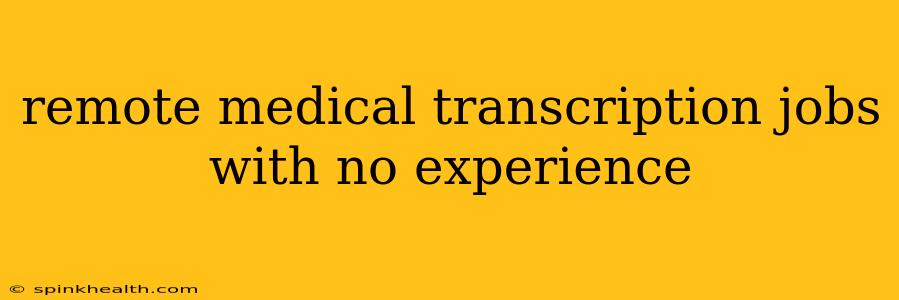The hum of a quiet home office, the satisfying click-clack of keys, and the knowledge that you're contributing to vital healthcare records – this is the reality for many medical transcriptionists working remotely. But breaking into this field without prior experience can feel daunting. This article will guide you through the process, addressing common questions and offering practical advice to help you launch your career.
Can I Get a Medical Transcription Job With No Experience?
Absolutely! While experience is always a plus, many companies offer entry-level positions or training programs specifically designed for aspiring medical transcriptionists. The key is to demonstrate your dedication, commitment to learning, and attention to detail. Think of it like this: many companies value the potential of a highly motivated individual willing to invest time and effort in mastering this skill, over someone with limited experience but a lack of enthusiasm.
What are the Requirements for Remote Medical Transcription Jobs?
While specific requirements vary depending on the employer, here are some common essentials:
- Strong Typing Skills: Speed and accuracy are paramount. Aim for at least 60 words per minute (wpm) with high accuracy. Practice regularly using online typing tests to improve your skills.
- Excellent Listening Skills: You'll be listening to audio recordings, so sharp listening comprehension is critical.
- Medical Terminology Knowledge: While not always a requirement upfront, familiarity with basic medical terms will significantly boost your chances and accelerate your learning curve.
- Computer Proficiency: Comfort using common software, including word processing and potentially specialized transcription software, is a must.
- Attention to Detail: Accuracy is non-negotiable in medical transcription. Any error can have serious consequences.
- Strong Grammar and Punctuation Skills: Your transcriptions must be grammatically correct and flawlessly punctuated.
What Training is Needed for Medical Transcription?
Several options exist for acquiring the necessary skills:
- Online Courses: Numerous online platforms offer comprehensive medical transcription courses, often including practice materials and certifications.
- Community Colleges: Many community colleges provide certificate programs in medical transcription, providing structured learning and potentially networking opportunities.
- Freelance Platforms: While not formal training, some freelance platforms may offer micro-tasks or small projects that allow you to gain experience and build a portfolio.
- On-the-Job Training: Some companies provide on-the-job training to new hires, guiding them through the process and providing mentorship.
What are the Best Companies for Remote Medical Transcription Jobs?
Researching different companies is crucial. Look for companies with positive employee reviews emphasizing opportunities for growth, training, and competitive pay. Consider factors like the software they use, their client base (some specialize in specific medical fields), and their support systems for new hires.
How Much Can I Earn as a Remote Medical Transcriptionist?
Earning potential varies based on experience, speed, accuracy, and the company. Entry-level positions may offer lower pay initially, but with increased proficiency and experience, your earning potential will significantly increase. Many medical transcriptionists work on a per-line or per-audio-minute basis.
How Do I Find Remote Medical Transcription Jobs for Beginners?
Start by searching online job boards, company websites, and freelance platforms. Use relevant keywords like "remote medical transcription," "entry-level medical transcription," or "medical transcription training." Networking is also key – connect with professionals in the field via online forums and social media groups. Highlight your strong typing skills, attention to detail, and commitment to learning in your applications. A well-crafted cover letter demonstrating your enthusiasm for the field can make a significant difference.
The path to becoming a successful remote medical transcriptionist may require initial effort, but the rewards – both financial and professional – are well worth it. With dedication, the right training, and a persistent approach, you can transform your passion for accuracy and detail into a fulfilling and rewarding career.

